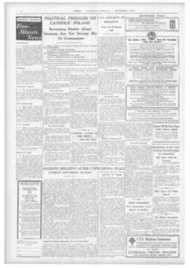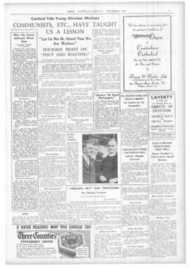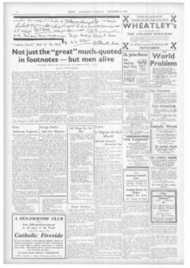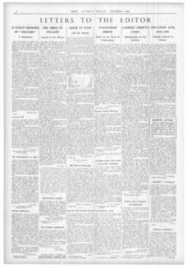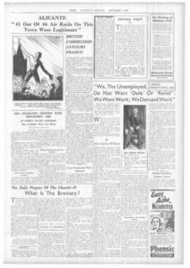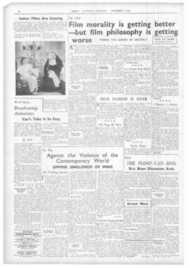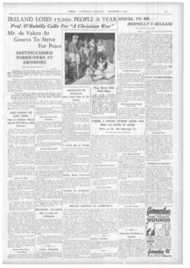Page 9, 9th September 1938
Page 9
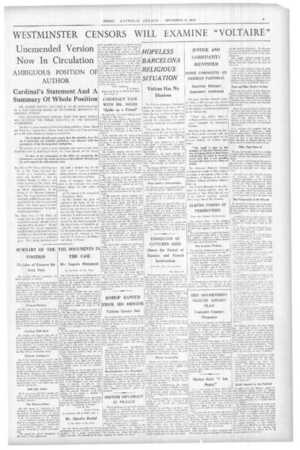
Report an error
Noticed an error on this page?If you've noticed an error in this article please click here to report it.
Tags
Share
Related articles
U.s. Call To End Finance For Violence
Letters To The Editor
Lenten Pastorals
Debates From Nukes To Newman
Why Christians Should Now Shake Hands With Socialism
JUSTICE AND CI iRISTIANITI IDENTIFIED ROME COMMENTS ON GERMAN PASTORAL Austrian Bishop's Argument Answered
The great German Pastoral Letter (of which a full summary was printed in the CATHOLIC HERALD of September 2) has created a tremendous impression in the Vatican city.
" Never has justice been so strikingly identified with the Christian cause," comments the Osservatore Romano.
Referring to the silence of the German Press, which contrasts with the enormous " impression made on the German faithful, the Vatican organ states: " The truth is that in the presence of the new Pastoral one can only keep silent or know how and be able to refute it word for word—and this is not possible because the Pastoral is a tissue of truths.
The CATHOLIC HERALD'S German correspondent reveals the Holy Father's annoyance at the famous article of the Archbishop of Salzburg in the review Schonere Zukunft (CATHOLIC HERALD., June 24).
The German Hierarchy in the references to Austria implicitly deny the argument of Mgr. Waitg that the case of the Austrian Catholics radically differs from that of the Germans.
ELEVEN POINTS OF PERSECUTION
From Our German Correspondent The pastoral letter of the German Bishops is far stronger and graver than the extracts which were spread by the international news agencies were able to suggest. The main departure in style from former pastoral letters is that there is no longer the slightest suggestion that National Socialism may have certain merits because of its fight against Bolshevism.
The Austrian Problem
The Austrian problem is referred to right at the beginning in the following words: " We send a fraternal and cordial greeting to the Hierarchy and all fellow Catholics in those countries which were formerly Austrian. It is unfortunately the same ideological struggle which is going on on both sides of the former frontier openly as well as secretly; it is the same object which our enemies aim at in their fight on this side and on their side, and the methods used are also The Bishops have not taken over any of the points which were stressed in the famous declarations of Cardinal Innitzer
and the Austrian Hierarchy. On the contrary, in welcoming their Austrian brothers, they welcome them as victims of the same persecution.
They suggest (without saying it explicitly) that the attitude of the Austrian Bishops obviously should be the same as their own.
That is very different from the point of view which Archbishop Waltz held up in his article in the Schonere Zukunft when he wrote that the Austrian Bishops could not be expected to adopt the same attitude as their German colleagues as circumstances were profoundly different.
Pope and Mgr. Waitz's Article When the two articles of Mgr. Waitz appeared in the Schonere Zukunft (which is a private publication in which Nazi sympathisers are very influential), the Archbishop of Salzburg was called once more to Rome (where he had been already less than four weeks before).
When he was received in audience by the Pope, the Holy Father had the two copies of Schiinere Zukunft on the desk and disapproved very definiteLy certain points in Mgr. Waltz's articles. 7The attitude of the Holy See seems to be entirely identical with that of the German Hierarchy.
It is therefore very probable that the Austrian Episcopal Conference which -meets in these days in Salzburg will come to a conclusion which is very near to the point of view of the German pastoral letter, although the Austrian Bishops may like to put it in somewhat milder terms, Why They Gave In We are, furthermore, now in a position to judge better what happened to Cardinal 1nnitzer and the other Austrian Bishops in March.
The review of the French Jesuits, Etudes, has reprinted a circular which Archbishop Waltz sent to the clergy of his diocese and in which he explained how things had come.
We learn front that extremely interesting document that the so-called ' Solemn declaration of the Austrian Bishops" had been drafted not by them, but by the Nazi Commissioner, Heir Buerckel, and that the Bishops were brought by very questionable methods into a position where the adoption of the " proposed" (this term is rather mild) statement seemed to them the lesser evil, The Persecution of the Church In eleven points chapter one of the German pastoral letter shows how the Catholic Church and its member.s are persecuted in Nazi Germany. Here are these poirrts (in brief); 1.Catholiee have no rights equal to other Germans and are not free to defend themselves against attacks. (Example: The expulsion of Bishop Sproll from his die 2. The Pope is insulted, although his only intention Las been to strengthen German Catholics in their faith.
a. Leading personalities of the Nazi Rartv have admitted that their aim is the destine.tion of Catholicism in Germany.
4. Catholics are frequently kept back from attending church; public life is " rre. confossinnnlisccl" under tho pretext that que unity of the nation is jeopardised by the existence of ecclesiastic: activities.
History is falsified in an anti-Catliolio manner, particularly in school-books, C. Catholic books, pamphlets and other imblications are censored in an 'inadmissible way; they are frequently forbidden, confiscated and destroyed.
7. Currency and morality trials are put en in a way which shows that not justice hut anti-Catholic propaganda is the main eaneere.
8. The Church is accused of being an ally of Bolshevism, although the contrnry is olivious to every unbiassed observer.
9. Every friendly word which the Pope pronounces about other Statee and natiOns is interpreted as anti-German and as constitiding a proof for an anti-German alliance of which the Holy Father is a member.
10. Propaganda is made in order to make Germans leave the Church. Catholic State officials, employees and workers suffer eco11011Lie and other disadvantages because of their faith, end so do students of secondary sellools and neiversities if they want to remain loyal to the Church.
11. The German marriage legislation cannot be admitted by the hierarchy without protest. The Bishops protest also against a clause in a new law about testaments in whieh the clergy is openly accused of trying freqnently to exploit. visits to dying persons tor obtaining material advantages for the The Bishops state that they have always been loyal and obedient to the State authorities, but that it has become increasingly evident that the leading people on the other side do not want a harmonious and friendly co-operation with the Church or at least a certain minimum of tolerance for Catholic institutions and activities. but on the contrary their annihilation. Either that has been their intention from the beginning or they have come gradually under the influence of such a tendency,
The German hierarchy wants to make it absolutely plain that they will under no circumstances yield to the Nazi blackmailing. Here are their own words: " We German Bishops want to declare for now and ever that we are not willing to buy benevolence or tolerance by giving up any portion of the substance of our religious faith or by abandoning the rights of the Church or by paying in loss of our personal courage and character."
Eight Appeals to the Faithful
In eight points the Bishops appeal to their diocesans asking them to remain loyal to Christ and to Christ's Church and to behave in all circumstances as good Catholics. Whatever the difficulties and the persecutions may be, Catholics should never despair.
The Bishops deplore that so many have to suffer because of their faith, and appeal to the solidarity feeling of the others who have the duty to support those who need help: " We are deeply concerned about the fact that many among our compatriots have to pay a tremendous price for their determination to remain loyal Catholics. We appeal, therefore, to the Catholic fellowship and solidarity so that, owing to mutual assistance, no one among our brothers may have to starve or be in poverty because of his faith."
blog comments powered by Disqus



